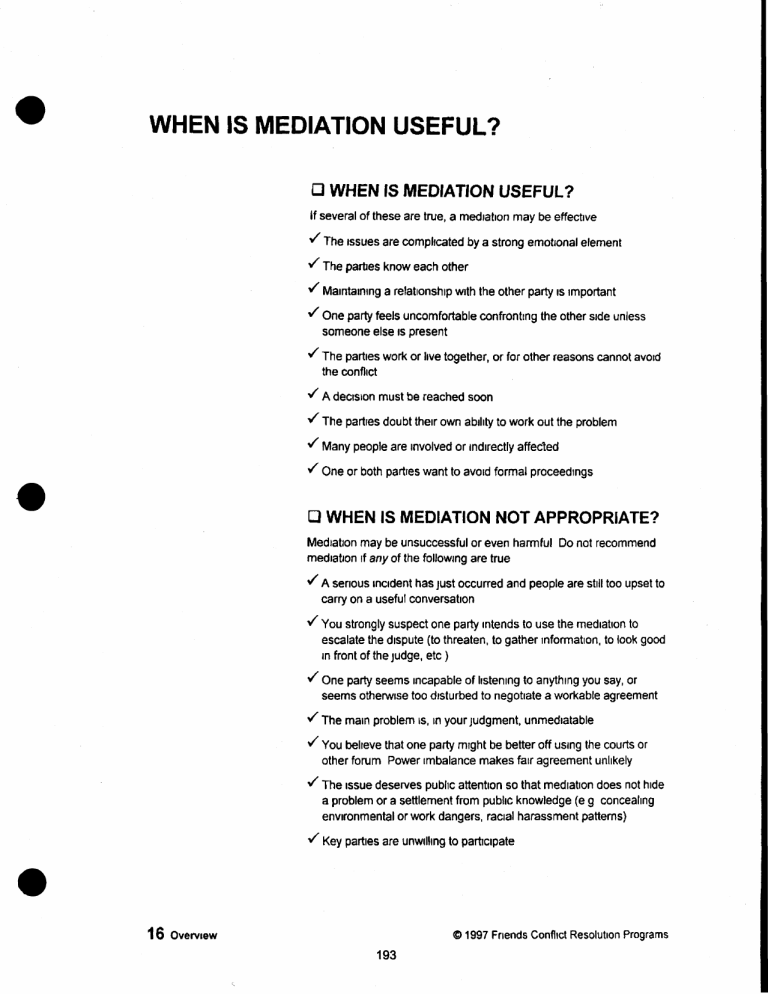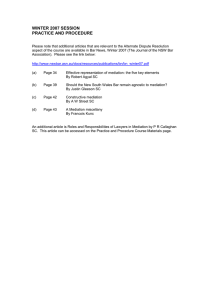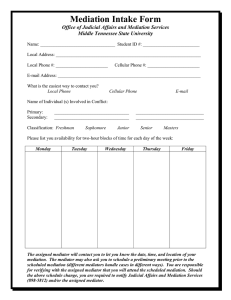
WHEN IS MEDIATION USEFUL? • WHEN IS MEDIATION USEFUL? If several of these are true, a mediation may be effective * The issues are complicated by a strong emotional element S The parties know each other S Maintaining a relationship with the other party is important S One party feels uncomfortable confronting the other side unless someone else is present S The parties work or live together, or for other reasons cannot avoid the conflict ^ A decision must be reached soon S The parties doubt their own ability to work out the problem S Many people are involved or indirectly affected S One or both parties want to avoid formal proceedings • WHEN IS MEDIATION NOT APPROPRIATE? Mediation may be unsuccessful or even harmful Do not recommend mediation if any of the following are true ^ A serious incident has just occurred and people are still too upset to carry on a useful conversation ^ You strongly suspect one party intends to use the mediation to escalate the dispute (to threaten, to gather information, to look good in front of the judge, etc) S One party seems incapable of listening to anything you say, or seems otherwise too disturbed to negotiate a workable agreement S The main problem is, in your judgment, unmediatable S You believe that one party might be better off using the courts or other forum Power imbalance makes fair agreement unlikely S The issue deserves public attention so that mediation does not hide a problem or a settlement from public knowledge (e g concealing environmental or work dangers, racial harassment patterns) S Key parties are unwilling to participate © 1997 Friends Conflict Resolution Programs 16 Overview 193 THE MEDIATOR • WHO MAKES A GOOD MEDIATOR? Different communities and different types of disputes need different mediators There is much room for vaned personalities and expenence However, some personal charactenstics and skills are particularly valuable in mediation > Strong "people skills," especially giving good attention > Able to be directive and to confront > Comfortable with high emotion, arguments, interruptions, tears > Respected and trusted > Imaginative in solving problems Several weeks ago, an old > Patient as disputants inch their way towards resolution woman and a young mother cned while they > Able to empathize and be gentle, to withhold judgment hugged each other at the > Impartial putting aside one's own opinions, reactions, and even end of a mediation some principles I don't get as excited by a successful agreement as I > Low need for recognition, credit, having things turn out your way used to, but their relief was so great, as if boulders • THE SATISFACTIONS OF MEDIATING theyd been carrying had just rolled away FCRP mediators speak about the challenges and satisfactions of On my way home, I found mediating myself getting tearyjust People get discouraged You have doubts too, but it is important to thinking about it say, "Yes, you are getting somewhere You are talking" It is a miracle to see at the end of the session how it has come together —a community mediator The simplicity of it is almost embarrassing In two hours people can solve "impossible" problems and let out hostility which has sometimes built up for years The exciting part of mediating is watching that process work again and again for different people in different situations I don't think I have ever done a mediation which hasn't in some way connected with my own expenences Each time I help another person solve a problem, I do the same for my own life There is always a feeling of exhilaration when things work out I almost always find some good thing about each disputant by the end Overview 23 © 1997 Friends Conflict Resolution Programs 194


